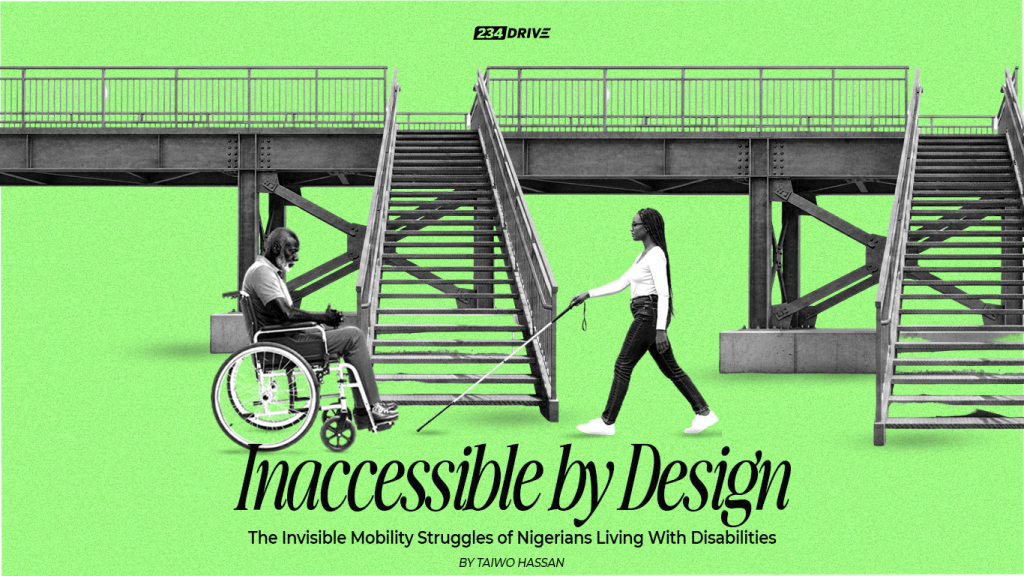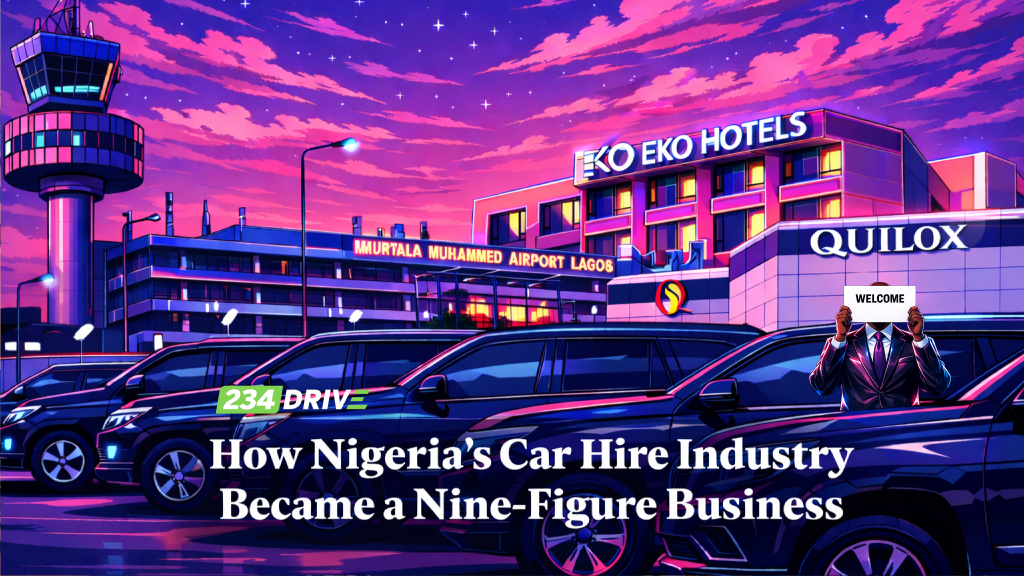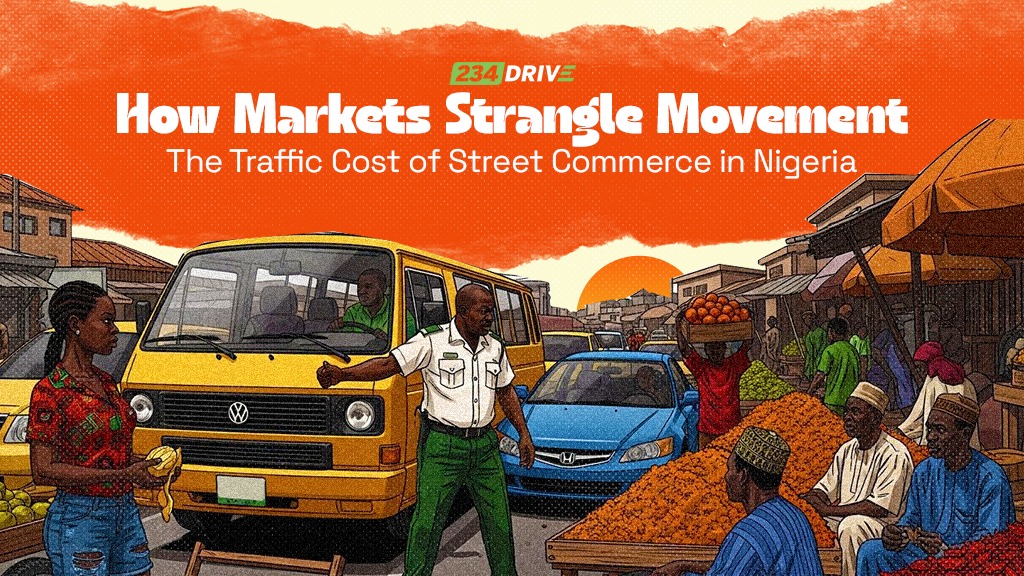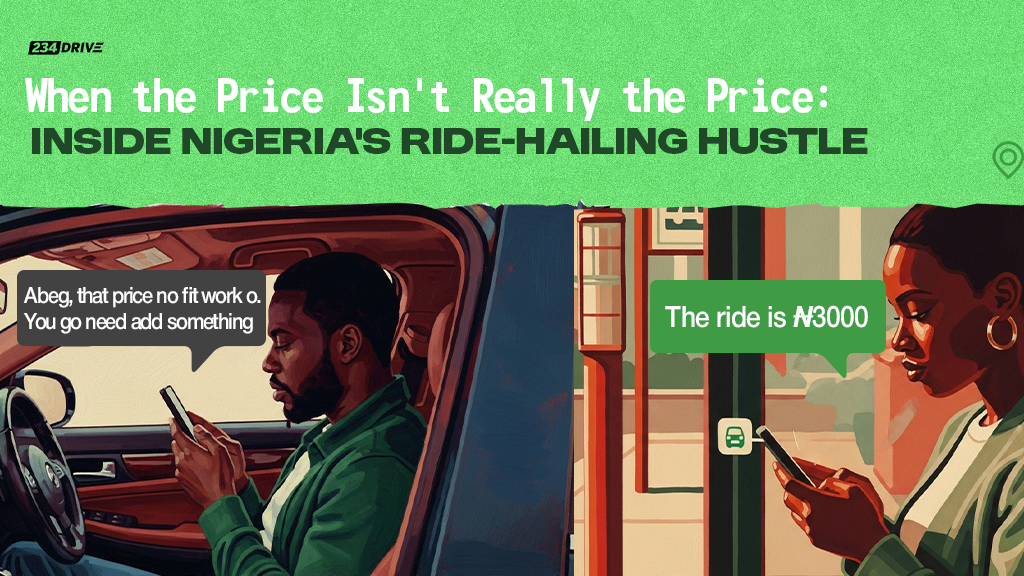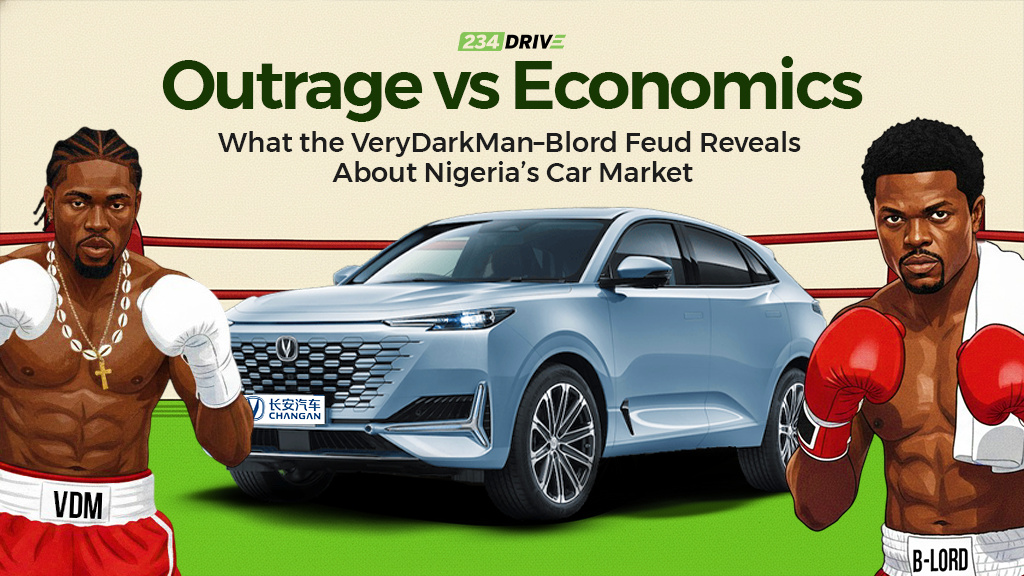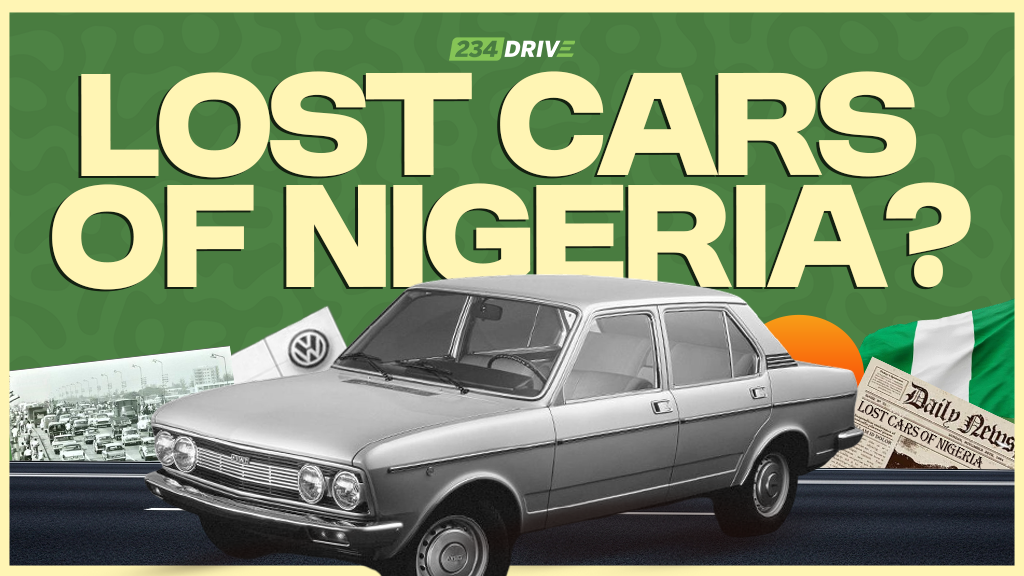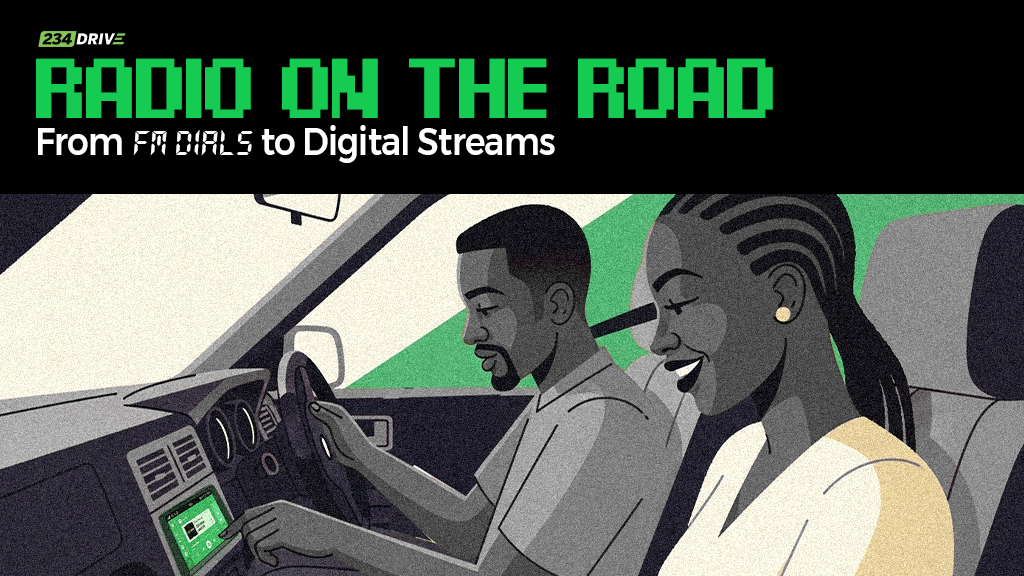For the average Nigerian, getting around is an experience that’s often fraught with stress, discomfort and/or costliness. Thousands of people living in Nigeria rely on various mass transit options, ranging from taxis, buses and tricycles (kekes) to motorcycles (okadas) and even bicycles to move around. The experiences on these transit options often reflect the chasm between the country’s social classes. However, these options also mirror other existing problems, a major one of which is the clear and persistent lack of accessibility in transit in Nigeria.
Accessibility in transit centres on the ease of use and accessibility of transportation services for people with disabilities (PwDs). Nigeria, with a population of over 218 million, has 35.1 million PwDs, according to the National Commission for Persons With Disabilities (NCPWD) 2023 report. Yet, many of the public or shared infrastructures present in the country still lack facilities designed for PwDs. In Nigeria, people with disabilities struggle more with commuting independently than those without disabilities, and this prevents them from fully participating in and contributing to society. All these and more are why accessibility in transit matters—it guarantees equal opportunities and better living conditions for everyone, especially when it comes to mobility, personal freedom, and the ability to be a fully functional member of society.
No one can deny the importance of emphasising the limited mobility options for PwDs in Nigeria. Whether in residential areas, healthcare facilities, schools, recreational areas, or anywhere, getting around continues to be a headache for PwDs. It’s a shame that many public mass transit options in Nigeria don’t consider accessibility when planning and designing their structures. In many of these buses, PwDs are more likely to encounter ill-mannered drivers who care less about their passengers and more about their pay and even worse, rude and impatient conductors who hurl insults at any chance they get. The private transit options are no better as most are designed to make a profit at the expense of comfort and accessibility. Because of this, there’s someone travelling in a wheelchair who has to go through the humiliation of being carried into the bus.
And there’s hardly a day in this country when there isn’t any drama on the road, on a bus, or in a taxi. It’s enough to make anyone frustrated and angry. Now, couple this with drivers trying to cheat you or charge you more, people giving you strange glances and waiting over an hour at a bus stop to board a packed bus, the reality for many PwDs is hard to imagine.
All these factors impact their economic and social capabilities and, ultimately, their quality of life. To shed more light on this, we spoke with more than 5 people living with disabilities about the unseen challenges they continuously face while navigating daily life in Nigeria.
‘Frustration, risk and determination’ are the words Fatimah Aderohunmu, a virtual assistant, disability rights advocate, and author of the bestselling book Beyond My Trials: My Journey With Muscular Dystrophy, chooses when describing her experience. ’I use a motorised wheelchair for mobility, and if I want to go out, I depend on private cars for transit because public transport is not wheelchair-accessible, especially in places like Ota, where the roads are bad,” Aderohunmu shares.
Among the various options used by Nigerians, motorcycles—popularly known as Okada—stand out as an accessible and easier means of transport for PwDs in Nigeria because of their inexpensive and one-on-one nature. Aside from these factors, there’s also less worry about communication barriers, uncomfortable reactions, or stereotypical projections on motorcycles, compared to buses and taxis.
‘I always prefer to go with motorcycles unless I am making a rather long-distance journey that would discourage the usage of bikes as a normal, convenient approach. I like the singularity of bikes. It is designed to carry only one passenger, and I can communicate with the driver easily. It means I am a sole passenger, I would be the sole focus, and he doesn’t have to accommodate other instructions from other passengers,’ Biola Funwontan, a teacher in Ibadan, tells 234Drive. ‘This also means I wouldn’t have to endure the stares and uneasy stereotypes from other passengers. People tend to look at me weirdly when I am in transit, and I indicate that I am deaf. I have never been able to endure the discrimination on their faces.’
Different Disabilities, Same Struggles: How PwDs Adapt to Nigeria’s Harsh Transit Realities
In Nigeria, there are many pointers to the fact that the transportation system is not designed to accommodate PwDs. If you’ve ever visited a government hospital, which is supposed to be the epitome of accessibility, it’s easy to notice the scarcity or poor maintenance of ramps and other supports for physically-impaired people. So, imagine the situation in a public bus park or on the bus itself. There are few to no ramps, restricted wheelchair access, and virtually no sort of assistance for sight-impaired people on public transportation. Then, as if this isn’t enough, many PwDs have to deal with Nigerians who are either nonchalant or ignorant about their actions towards PwDs. All these and more are what many PwDs think about way before they decide to go anywhere.
’Inconsistent routes, oddly sectioned steps on some of the cross-over bridges, lack of ramps or super steep ramps, and barely functioning buses are some of the challenges I keep encountering,’ says Iyanuoluwa Adenle, a Lagos-based writer. ’Moving around costs more for me as a disabled person, and that cost is not the same on a daily basis. Taking public transportation costs me mental and physical stress. As a fat, disabled woman, the people you share public transportation with can also be inconsiderate and just plain nasty. Bus conductors and drivers can also be inconsiderate. I would rather pay for a little bit of ease.’
Funwontan also explains how moving around for him often means finding creative and often exhausting ways to ensure he’s not being cheated. ’Because I am deaf, I am sometimes cheated on my fare. Sometimes, I have had to pay more than the regular fare unless I am used to the destination I am heading to and know the regular price. In some cases, I can’t hear when destinations to places are being called, so I might end up in a different place than where I am really going. For this reason, I always have to repeat myself to let them know where I am going and consult people. It is very tiring and sometimes makes me feel like a child. When I am in transit, I also need to be alert and keep in mind where I am headed. I simply can’t sleep off.’
Until former President Muhammadu Buhari signed the Discrimination Against Persons with Disabilities (Prohibition) Act into law in 2019, there was no systemic or statutory ruling or act on the discrimination against persons with disabilities. This, among many other reasons, explains why in a country with a significant population of people living with some form of disability, there’s little to no awareness and education about interacting with PwDs. More importantly, because there are no consequences, it’s easy for some abled Nigerians to turn a blind eye or even contribute to the unfair incidents that PwDs experience when moving around.
Cynthia Toochi Nwafor, a final year Mass Communication student at the National Open University of Nigeria and an Abuja-based entrepreneur, says her challenges stretch beyond communication barriers or people’s unfamiliarity with sign language. For her, it is more about their impatience and lack of consideration.
’Imagine spending 30 minutes to an hour just trying to board a public bus or taxi because I need the driver to stop long enough for me to ask questions before getting in. If I am rushed and believe I have correctly read their lips, I risk ending up at Point A when my destination is actually Point B,’ Nwafor says. ’That’s wasted time, wasted money and it messes with my mood so badly that I often arrive at where I’m going, grumpy and almost in tears. And no, it’s not a Lagos problem. I currently live in Abuja and what I’m sharing is my current reality. I feel like I fared better with Lagos drivers where I could display craze and match shouting.’
’When I go out on my own, nobody talks about how hard it can be when I can’t find anyone to help wheel me to my destination,’ Omowummi Nafisat, a recent graduate of Obafemi Awolowo University, who has a mobility impairment, bemoans. ’I wish there were more considerate people in that regard. It’s one of the reasons I still look forward to getting an automatic wheelchair; with it, I don’t have to worry too much about asking people for assistance.’
BRTs, Ride-Hailing Services and the Potential of Better Solutions
Because of Nigeria’s scarcity of inclusive facilities, it’s easy for many to believe that the government is barely doing anything to improve accessibility in transit. However, a few initiatives stand to show that easy mobility in public transit options isn’t a far-fetched reality for people living with disabilities in Nigeria. ’I have tried the cabs and BRTs in Lagos, which were truly accessible. The idea of sitting comfortably with my wheelchair secured, entering through a ramp, and not being carried like luggage is something I dream of, and I enjoyed the BRT because of that.’ Aderohunmu explains.
Additionally, the importance of ride-hailing apps in this context cannot be overstated. In a country where public transport is just another type of hell, it doesn’t come as a surprise that many young PwDs prefer ride-hailing services and consider them more reliable and convenient. Imagine moving about as a PwD in a well-air-conditioned car where the app does most of the talking, and your destination’s direction is right there on Google Maps. All you need to do is pay and alight at your preferred destination.
Adenle remarks that she prefers ride-hailing services like Uber, Bolt and InDrive when their fares are reasonable. ’It is just convenient and accessible. I don’t like walking long distances to connect to bus stops or the inconsistent transit network system in a city like Lagos.’
Nwafor also supports this, explaining that e-hailing apps like Bolt and Uber erase the need to deal with all the drama that comes with exchanging words. ‘I can do most of the communication on the app, with minimal interaction outside of it.”
However, it’s important to remember that while BRTs and ride-hailing apps improve accessibility, most of them work only in metropolitan Nigerian cities; Uber, for example, is only available in 12 Nigerian cities. This means that for PwDs in less developed places, access to these resources is still limited or non-existent. For instance, the absence of Uber and Bolt in Ota, a small town in Ogun State, often leaves Aderohunmu with no choice but to stay home.
In light of this, it’s now glaring that we must take conscious and proactive steps to improve the mobility experiences for PwDs, no matter where we are. Improving accessibility in transit could send ripples of change—dismantling discriminatory practices and fostering inclusion for PwDs in Nigeria. And I can already tell what you’re thinking: how can this be achieved?
- Policy Implementation and Enforcement
While the Discrimination Against Persons with Disabilities (Prohibition) Act of 2018 mandates that PwDs have equal access to physical structures, healthcare, education, transportation, and employment, among other things, much hasn’t been done to implement and enforce the law in the country. Till today, we still see the poor condition of some facilities designed for PwDs and how these structures have been neglected in several areas. Funwontan told us how there are hardly any sign language interpreters or visual aids in public transit spaces. He added that even basic amenities like digital boards showing next stops or emergency instructions are missing in many areas. This shows how dire it is to enforce this Act to make getting around less difficult for PwDs.
Aderohunmu also believes that most policies around accessibility exist only on paper. According to her, Nigerians are ‘led by example,’ and improving accessibility begins with those in power. ’The government needs to start implementing change by enforcing accessibility standards, and transit organisations must invest in inclusive infrastructure like low-floor buses with ramps and trained personnel, just like in the BRT buses. I just heard about the accessibility of the Lagos-Ibadan train and I can’t wait to explore it as well. I don’t think accessibility is a privilege, it’s our right. They should also make laws on how to stop cab drivers from overcharging passengers with disabilities,’ she urges.
- Increased public education and awareness
Increasing inclusion and sensitising the public are necessary to preserve the rights and dignity of PwDs in Nigeria.
Nwafor reveals how insensitive Nigerians can be when interacting with her. ’When I say I’m deaf, some people find it hard to believe. Sometimes they laugh like it’s the funniest joke. Some say I don’t look deaf, while others even ask how I can speak if I say I’m deaf. Or say things like, “Fine girl like you” as if disability comes with a particular look,’ she laments.
Adenle believes that solutions such as making places accessible and inclusive, while having junctions of rest for people, will ease mobility for many PwDs in Nigeria. ’The government should ensure that there are boards showing transit network systems to different parts of the city in public parks, and carpooling should be encouraged,’ she adds.
Better Mobility for PwDs: How Every Nigerian Can Help
The importance of abled Nigerians joining hands to ease mobility for PwDs cannot be stressed enough. It’s as simple as helping anyone in a wheelchair find their way or learning the proper language to communicate with PwDs. Many PwDs often mention how they detest being pitied or treated like children. ‘Be patient and respectful. Offer help, but don’t force it,’ says Aderohunmu. ‘Non-disabled Nigerians need to educate themselves about accessibility, advocate for inclusive transport, and stop parking in spaces reserved for people with disabilities.’
Some PwDs also stress the importance of learning basic sign language, speaking clearly and making eye contact when interacting with them. ’Be patient. Don’t shout or get angry when we don’t respond the way you expect. Offer to write things down and help us explain things,’ Nwafor advises. ’A lot of times when I’ve had issues with drivers, no passenger spoke up for me. This often happens because they assume I’m lying about being deaf. Learning a few basic signs would go a long way, too.’
To this, Funwontan adds, ‘Don’t assume I need pity or can’t manage on my own. Instead, ask if I need help before stepping in. Sometimes, a small gesture like pointing to a sign, writing something down, or helping me read a confusing notice can make a huge difference. Also, speak clearly and make eye contact when talking to me. Many deaf people read lips to some extent. And avoid covering your mouth or looking away mid-sentence. These simple, mindful actions can turn a frustrating trip into a smoother, more dignified experience.’
Final Thoughts: Moving Towards Inclusion
While speaking with the people in this story, I asked them to describe their experience moving around in three words. Their responses revealed something interesting: every one of them had similar answers, so much that it felt like they planned to give synonyms for certain words. Frustration, anger, helplessness, stress, survival, confusion, anxiety, difficult, inconvenient, uncomfortable and upsetting were recurring. These are people with different disabilities and lives. But when it came to the experience of navigating mobility in Nigeria, everyone had a similar story.
Additionally, these conversations showed that while many PwDs don’t know what it means to move about in a country that barely considers them, some are beginning to see optimistic and tailored innovations by the government. Nevertheless, there’s no doubt that the government has a lot of work to do to improve accessibility in transit.
And as an abled person, it’s important to acknowledge your privilege and think about how you can spark a significant change with it. Learn how to help different PwDs, teach others, practice consideration and stand up for them wherever it’s needed. Many PwDs in this country have existed as an afterthought for most of their lives. For many, moving about has become a painful cocktail of survival, necessity and uncertainty. Each step, move, and decision anytime they have to go somewhere is a test of how elastic their limits are. It’s far from an enjoyable experience and more about enduring impatience, judgment and discrimination from strangers. Accessibility and inclusion for PwDs in Nigeria shouldn’t be a privilege, but a human right. So the next time you see any driver charging any PwDs extra money, don’t hesitate to speak up against it.


